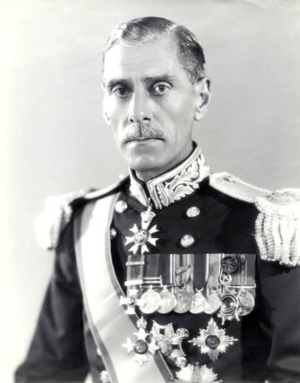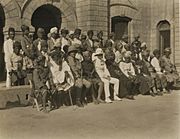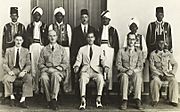Stewart Symes facts for kids
Quick facts for kids
Sir George Stewart Symes
|
|
|---|---|

Stewart Symes by Bassano. 12 July 1938
|
|
| Resident at Aden | |
| In office 1928–1931 |
|
| Preceded by | John Henry Keith Stewart |
| Succeeded by | Bernard Rawdon Reilly |
| Governor of Tanganyika | |
| In office 1931–1934 |
|
| Preceded by | Donald Charles Cameron |
| Succeeded by | Harold MacMichael |
| Governor-General of Sudan | |
| In office 10 January 1934 – 19 October 1940 |
|
| Preceded by | John Maffey |
| Succeeded by | Hubert Huddleston |
| Personal details | |
| Born | 29 July 1882 Wateringbury, Kent |
| Died | 5 December 1962 (aged 80) Folkestone, Kent |
| Military service | |
| Rank | Lieutenant Colonel |
Sir George Stewart Symes, GBE, KCMG, DSO (29 July 1882 – 5 December 1962) was a British Army officer and colonial governor.
Career
Symes was born in Kent, the son of Lieutenant Colonel William Alexander Symes of the 71st Highland Light Infantry, and Emily Catherine (née Shore), daughter of Charles Shore, 2nd Baron Teignmouth.
Symes was commissioned a second lieutenant in The Hampshire Regiment in August 1900, and served in South Africa during the end of the Second Boer War in 1902, receiving the rank of lieutenant on 21 April 1902. Symes took part in the Battle of Rooiwal and was stationed for a while in Potchefstroom. He later stayed briefly in the town of Hermanus which he described as "peaceful." Later that year he was posted in the Aden Hinterland, where he served 1903–1904. He is said to have been the only British army officer to be awarded a Distinguished Service Order (DSO) for services in the hinterland.
He was Governor of the Palestine North District from 1920 to 1925, Chief Secretary to the Government of Palestine from 1925 to 1928, Resident at Aden from 1928 to 1931, Governor of Tanganyika from 1931 to 1934 and Governor-General of the Anglo-Egyptian Sudan from 1934 to 1940. During his time in Tanganyika he gained a reputation for governing in the interest of the indigenous African population. This led to him becoming unpopular with some of the white settlers in that country and in neighboring Kenya, and he was known as being one of the most "pro-African" colonial governors.
On every issue in which there was conflict between indigenous Africans and European settlers he governed in favor of the Africans. On multiple occasions he had European settlers deported from the country on the grounds they were mistreating Africans. There were British District Commissioners who were administrators under previous governors, and during their time in Tanganyika had learned to speak the Tongwe and Bende languages before being rotated out, Symes had them recalled to Tanganyika and stationed in areas that spoke Tongwe and Bende. He also devoted government resources towards water purification projects, literacy programs and the administration of antibiotics to natives.
On numerous issues he promoted encouraging the native population to vote on matters that effected them. He also insisted, as did his predecessor, that Africans be paid the same wages as Europeans and Indians for the same work. When asked in the 1950s if he supported African independence movements he said that he did.



